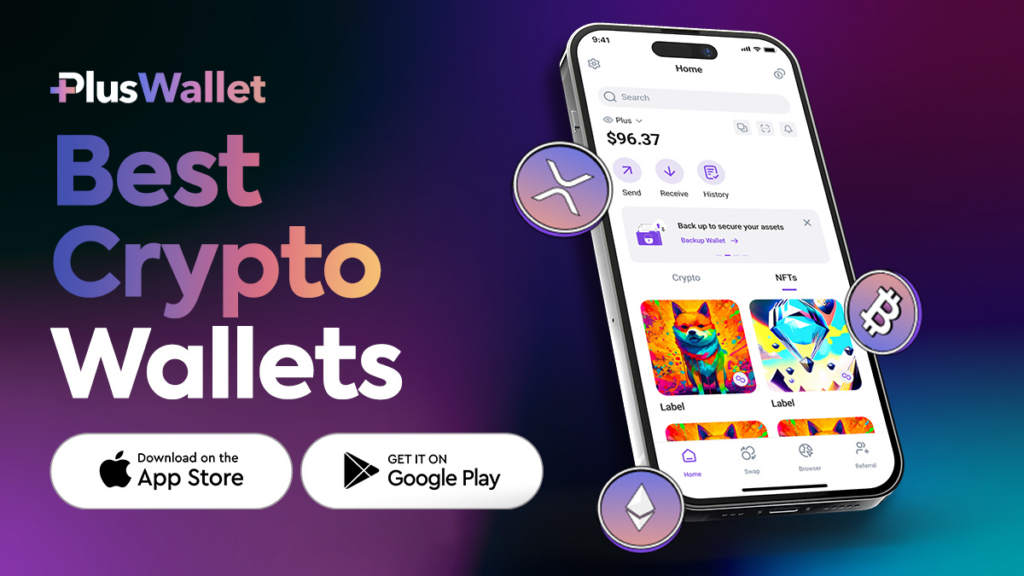In 2024, a startling 60% of cryptocurrency losses were attributed to vulnerabilities in centralized exchanges. This alarming trend has propelled many towards decentralized wallets as a safer harbor, offering enhanced asset protection and potential for gain.
Decentralized wallets are not just secure havens; they are essential tools for modern traders, blending formidable security with ease of use. They cater to both newcomers and seasoned traders by offering cross-chain compatibility and opportunities for passive income.
This article explores the leading four decentralized crypto wallets—Plus Wallet, Trezor, Exodus Wallet, and Best Wallet—providing insights to help you pinpoint the wallet that meshes seamlessly with your crypto journey.
1. Plus Wallet: Ultimate Safety with Infinite Rewards
Plus Wallet is a beacon among decentralized crypto wallets, offering unfettered control, robust security, and a continuous stream of rewards. It ensures that private keys remain on users’ devices, sidestepping the potential pitfalls of server storage and blocking any unauthorized data access.
This proactive approach significantly lowers the risks linked to centralized data repositories, enhancing overall security. Plus Wallet further secures assets with features like two-factor authentication, including Face ID and PIN options, creating a fortress around your digital wealth, even if your device falls into the wrong hands.
Getting started with Plus Wallet is straightforward—no KYC required—allowing you to maintain anonymity while engaging with diverse networks such as Bitcoin, Ethereum, and Solana.
This wallet doesn’t just secure digital assets; it also enriches its users through lucrative passive income schemes rewarding trading and referrals, opening the door to limitless potential for rewards.
2. Best Wallet: The Hub for Multi-Chain Asset Management
Best Wallet, a versatile multi-chain, non-custodial wallet, supports over 1,000 assets across multiple blockchains, including heavyweights like Bitcoin, Ethereum, and Solana. It bolsters security with two-factor authentication and biometric safeguards.
Beyond basic wallet functions, Best Wallet leverages its $BEST token to offer perks such as reduced gas fees and airdrop rewards, enhancing user engagement. It also provides early access to crypto projects and analyzes market sentiments through social media data.
However, fiat transactions require KYC, and the most sophisticated features remain exclusive to $BEST token holders.
3. Trezor: Cold Storage Built on Trust
Trezor champions privacy by foregoing KYC protocols and storing private keys in cold storage, far from online threats. Its commitment to transparency is evident through its open-source firmware, inviting users to personally verify its security measures. Trezor’s range includes Model One ($59), Safe 3 ($79), Model T ($149), and Safe 5 ($169), supporting an extensive array of cryptocurrencies.
While it lacks features like native staking or Bluetooth connectivity, Trezor focuses on delivering solid security essentials. However, the higher cost and limited mobile interaction may deter those seeking more flexible or feature-rich crypto management solutions.
4. Exodus: Simple Swaps with an In-Built Exchange
Exodus empowers users by placing the control of private keys directly in their hands, eliminating the need for KYC at setup or during transactions. It safeguards privacy by encrypting private keys and transaction data on the device. Yet, buying crypto with fiat money does involve KYC through partners like Ramp.
Supporting over 300 cryptocurrencies, Exodus offers a straightforward platform for both beginners and experts, featuring a built-in exchange for direct swaps, albeit with fees that might exceed those of some competitors. However, it falls short in terms of advanced security features like two-factor authentication.
Leading Decentralized Crypto Wallet for You
Each wallet outlined here shines with unique features, making them the leading decentralized crypto wallets in 2024. The ideal wallet for you hinges on your specific needs and preferences.
Exodus Wallet is suited for those who value convenient exchange services and are okay with slightly higher fees. Trezor is tailored for users desiring a robust, hardware-based security approach without needing mobile connectivity.
Both Plus Wallet and Best Wallet excel for those who seek flexibility in managing multi-chain assets. However, accessing advanced features in Best Wallet necessitates holding $BEST tokens, whereas Plus Wallet offers a broad range of features and rewards readily accessible via a user-friendly app. Selecting the right wallet is crucial for ensuring your crypto endeavors are both secure and prosperous.
Disclaimer: Any information written in this press release does not constitute investment advice. Optimisus does not, and will not endorse any information about any company or individual on this page. Readers are encouraged to do their own research and base any actions on their own findings, not on any content written in this press release. Optimisus is and will not be responsible for any damage or loss caused directly or indirectly by the use of any content, product, or service mentioned in this press release.



